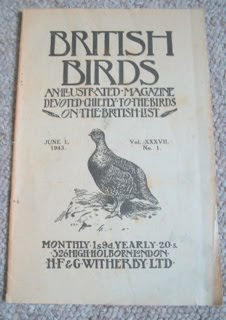I was recently very fortunate in discovering 14 copies of British Birds Magazine's in a charity shop in Lancaster dating as far back as 1943 - the oldest cover of which is pictured above - and I regard myself as pretty lucky to have done so.
British Birds was first established in 1907 and at the time incorporated The Zoologist which was established in 1843. Today the monthly magazine is the creme de la creme of ornithological literature, the only 'personal' opinion I would make of it is that it is maximum in its scientific content which, if you don't particularly want or have the need for science in your 'birding' interest then forget it. I decided to cease subscribing to the magazine when I became saturated with the aforementioned science some of which - never being one to shy away from the truth about myself - was a little too much for me to take in at times.
Sixty six years ago the magazine cost £1 for 12 monthly copies, the last I heard it was in excess of £60 per year......how things change. It was printed on newspaper and was just 20 pages long and one particular section of these old magazines are the 'Notes' and this section continues today and was the most interesting aspect of the publication for me and I was fortunate enough to have two of my own 'Notes' published over the years I subscribed to the magazine. One example in this 1943 issue is that of an observer recording what the magazine claims to be the first ever Redwing in full song in Britain and was seen/heard off the west coast of Ross-shire on 13 April 1943 on the Isle of Tanera. As you can imagine there is some fascinating reading in these by now rather ancient issues.
And finally......today is the 6th anniversary of the 6th White- winged Black Tern to be recorded in the LDBWS area and was present over the salt marshes in the Conder Green/Glasson Dock area including occasional visits to the now 'famous' Conder Pool. The bird - a superb moulting adult - was frequently observed feeding on flying insects and was found to be particularly adept at catching Small Tortoiseshell butterflies to which I must claim......if it had turned up here this year it would certainly not have fed on this species of butterfly today or any other day in 2009. The only other August record of WWBT in the LDBWS previous to this one was of a juvenile at Leighton Moss in 1969, but a long staying adult was frequently seen on the Lune Estuary on 22 June - 9 July 1973, with one - presumed the same bird in moult - seen on 27 July 1973.

I think British Birds has a nice
ReplyDeletebalance these days - I think perusal of a recent edition would perhaps revise your 'over-scientific' view. I would especially recommend the recent supplementary issue updating the Birds of Conservation Concern - right up your street, I would suspect, as a reference source.
John Bateman will be after you re-omission of another WWBT he found [Leighton, then what is now Borwick Waters]!
Regards
Pete
Yes point taken re John being 'after me' for omitting the 2nd summer bird he found at LM which then spent the rest of the day at Dockacres on 15 July 1990.
ReplyDeleteIncidentally this was the last record before having to wait 13 years for the Conder/Glasson superb moulting adult.
Thanks again for your comments Pete.
Pete. Excellent read of your latest blogs re history of Bird Mags.I also don't want to get too scientific about my bird watching but do enjoy a good read. I have been subscribing recently to Birds Illustrated magazine a newcomer on the scene. A magazine devoted more to the art and photography side of our wonderful " way of life " Sadly this lovely magazine has become another victim of the economic downturn and will cease publication after the Autumn issue.
ReplyDeleteNot for me to make comments to put off anyone considering subscribing to British Birds and was never my intention to do so, a magazine I enjoyed for a few years until the aforementioned science grinded me down. One of the best ever examples of this was when I once tried to read about six pages of graphs of bird song......excuse me!
ReplyDeleteThanks for comments Brian.